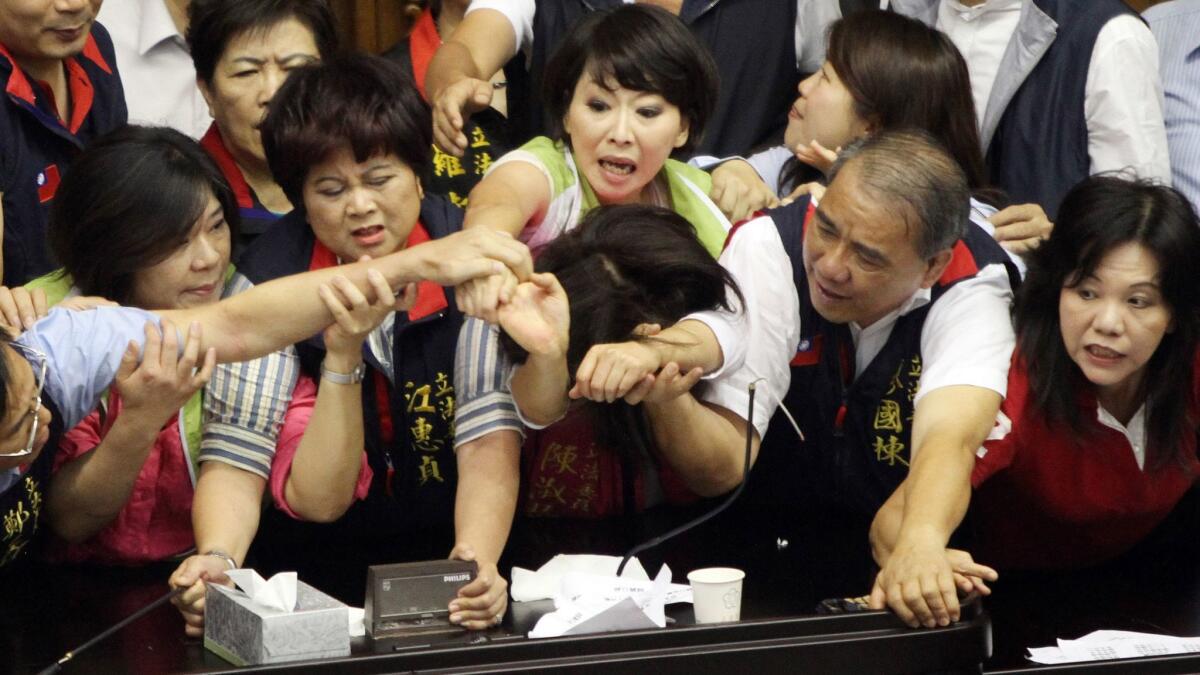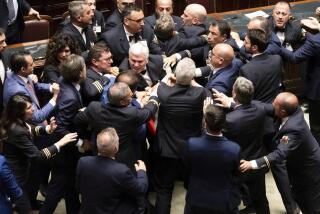Get ready to rumble: Taiwan’s legislative battles feature punching, shoving and tackling

Reporting from Taipei, Taiwan — Swivel chairs and water balloons flew through the air. One woman batted another across the face as their teammates struggled to separate them. The crowd waved placards as cash tossed from outside the ring rained down on the fighters. Whistles screeched but did little to quell the melee.
Alex Fei threw Lee Chun-yi to the floor, jumped on his chest and held him in a headlock. Wu Ping-jui used a chair to deflect a balloon.
For the record:
11:12 p.m. June 24, 2019An earlier version of this story incorrectly referred to Hsiao Bi-khim, a legislator from the ruling party, as a man. Hsiao is a woman.
Lin Chuan stood glumly on the sidelines in a dark blue suit.
He wasn’t watching a World Wrestling Entertainment event. It was a plenary session last month in Taiwan’s parliament.
Fei, Lee and Wu are legislators. And Lin is the island’s premier.
Shoves, punches and necktie pulls are a way of life in Taiwan’s parliament. One fight involved a stun gun.
Like many fights, the one last month started over money — $32 billion that nearly everybody agrees is needed for major infrastructure upgrades over the next eight years. Exactly how to spend it is a sore spot.
With its majority, the ruling Democratic Progressive Party largely controls the purse strings and pushed through a plan to spend the first $3.3 billion on flood control, light rail and other projects.
But members of the opposition Nationalist Party charged that plan was guided by politics, with the investments directed to the cities and counties most loyal to the government.
The fighting continued for a total of five days. Nobody was seriously hurt, but one legislator complained of breathing problems, said Hsiao Bi-khim, a legislator from the ruling party.
Such spectacle dates back to the 1980s and the early days of democracy in Taiwan after four decades of authoritarian rule.
Experts suggested that fighting is a symptom of immaturity in new democracies, where negotiating and accepting defeat can be foreign concepts. The former Soviet republics of Georgia and Ukraine have experienced similar violence.
Fights can force negotiation, as was the case with three brawls in 2013 over trade with China.
Fighting also allows lawmakers — particularly those from the minority — to demonstrate their passion and commitment to an issue when their side lacks the power to get its way.
“Parliament members would use that method to stand out on some issues,” said Wang Yeh-lih, comparative politics professor at National Taiwan University. “It became part of the legislature’s culture.”
Like professional wrestling, the rumbles are often staged, with the aggressors warning their targets in advance and reminding them it’s not personal. Many legislators plan ahead to make sure television cameras are in place to capture the action.
Brawls can also be an effective if crude form of filibustering to block lawmakers from taking the podium and thus preventing bills from going to a vote.
“You’ve got to have some way to stop it,” said Cheng Chao-yi, a retired Taiwan colonel who has protested outside parliament against pension reform.
Joanna Lei was at the podium in 2007 urging fellow lawmakers to authorize direct flights to China — which views Taiwan as a rogue province — when she was ambushed by opponents who had been hiding under a table.
Lei, who knew the “stampede” was being planned but was still caught off guard, suffered a broken finger.
She jokes now that her injury was “for a good cause” — her side eventually won the debate over starting flights to China.
Lei, who has left the legislature and now runs a think tank in Taiwan, keeps an X-ray as proof that the broken finger wasn’t part of her own dramatization.
“A lot of time those women legislators will fake their fainting, so you have to be careful,” she said.
And what do voters make of the brawling?
Some appreciate it for the entertainment value and the political passion on display.
But others are turned off by the fights and expect lawmakers to settle their disagreements peacefully through parliamentary rules, with some experts suggesting that the biggest offenders could pay a price in next year’s elections.
Liu Yih-jiun, public affairs professor at Fo Guang University in Taiwan, said the public appetite for fights is already fading and will eventually disappear: “Give Taiwan another 10 to 20 years.”
Hsiao of the ruling party said that although some Taiwanese accept some “confrontation” over divisive issues such as China policy or nuclear power, voters are likely to be turned off by last month’s fighting over infrastructure.
She accused the opposition of “trying to sabotage the government’s efforts.”
“Their only consistency is sabotage,” she said.
But Lin Wei-chou, the caucus whip of the Nationalist Party, said the ruling party blocked anybody else from a turn chairing the finance committee, leaving his own party few options.
“If they keep up like this, it’s hard to avoid another conflict,” he said. “We’ve heard criticism from the public about our fights, but it’s hard to explain these laws to them.”
Jennings is a special correspondent.
ALSO
The Trump administration sends mixed messages on North Korea
India’s first LGBTQ radio show aims to broaden the country’s concept of love
More to Read
Sign up for Essential California
The most important California stories and recommendations in your inbox every morning.
You may occasionally receive promotional content from the Los Angeles Times.










